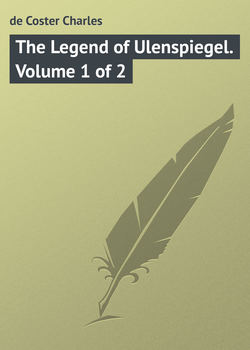Читать книгу The Legend of Ulenspiegel. Volume 1 of 2 - de Coster Charles - Страница 7
Book I
VII
ОглавлениеOn that same day, His Sacred Majesty Charles resolved to hold high festival to celebrate the birth of his son befittingly. Like Claes he determined to go a-fishing, not in a canal, but in the pouches and pockets of his people. Thence is it that sovereign houses draw crusadoes, silver daelders, gold lions, and all those miraculous fishes that change, at the fisher’s will, into velvet robes, priceless jewels, exquisite wines, and dainty meats. For the rivers best stocked with fish are not those that hold most water.
Having brought together his councillors, His Sacred Majesty resolved that the fishing should be done in the following manner.
His lordship the Infante should be borne to baptism toward nine or ten of the clock; the inhabitants of Valladolid, to testify their joy, should hold revelry and feast all night long, at their own charges, and should scatter their silver upon the great square for the poor.
In five carfaxes there should be a great fountain spouting until daybreak with strong wine paid for by the city. In five other carfaxes there should be displayed, upon wooden stages, sausages, saveloys, botargoes, chitterlings, ox tongues, and all kinds of meats, also at the city’s charges.
The folk of Valladolid should erect at their own expense, along the route of the procession, a great number of triumphal arches representing Peace, Felicity, Abundance, Propitious Fortune, and emblems of all and sundry gifts from the skies with which they were loaded under the reign of His Sacred Majesty.
Finally, besides these pacific arches, there should be set up certain others on which should be displayed in bright colours less benignant emblems, as lions, eagles, lances, halberds, pikes with wavy bladed heads, hackbuts, cannons, falconets, mortars with their huge jowls, and other engines showing in image the might and power in war of His Sacred Majesty.
As for the lighting of the church, it should be graciously permitted to the Guild of Candlemakers to make free gratis and for nothing more than twenty thousand wax tapers, the unburned ends of which should revert to the chapter.
As for any other expenses, the Emperor would gladly bear them, thus showing his kindly determination not to burden his people overmuch.
As the commune was about to carry out these orders, lamentable tidings came from Rome. Orange, Alençon and Frundsberg, captains of the Emperor, had entered into the holy city and there sacked and spoiled churches, chapels, and houses, sparing no living soul, priests, nuns, women, children. The Holy Father had been made prisoner. For a whole week pillage had never ceased, and Reiters and Landsknechts were wandering through Rome, stuffed with food, drunken with wine, brandishing their weapons, hunting for cardinals, declaring they would cut enough out of their hides to save them from ever becoming popes. Others, having already carried out this threat, strutted proudly through the city, wearing on their breast rosaries of twenty-eight or more beads, big as walnuts, and all bloody. Certain streets were red streams in which lay heaped the rifled bodies of the dead.
Some said that the Emperor, needing money, had determined to fish for it in the blood of the Church, and that having taken cognizance of the treaty imposed by his commanders upon the captive pontiff, he forced him to cede all the strongholds in his states, to pay four hundred thousand ducats and to be prisoner until all was duly carried out.
None the less, great was His Majesty’s grief; he countermanded all the joyous preparations, all feasts and rejoicings, and ordered the lords and ladies of his palace to don mourning.
And the Infante was baptized in white robes, the hue of royal mourning.
And lords and ladies interpreted this as a sinister omen.
For all this, my lady the nurse presented the Infante to the lords and ladies of the palace, that these might, as is the custom, offer good wishes and gifts.
Madame de la Coena hanged upon his neck a black stone potent against poison, the size and shape of a hazelnut, with a gold shell; Madame de Chauffade fastened upon him, by a silken cord, hanging down upon his stomach, a filbert, the which bringeth good digestion of all nourishment; Messire van der Steen of Flanders gave a Ghent sausage five ells long and half an ell in thickness, wishing that at its mere fragrance His Highness might be thirsty for clauwaert in the manner of the people of Ghent, saying that whoso loveth the beer of a town will never hate the brewers; Messire Squire Jacque-Christophe of Castile prayed my Lord the Infante to wear green jasper on his tiny feet, to make him run well. Jan de Paepe the fool, who was there present, exclaimed:
“Messire, give him rather the trumpet of Joshua, at the sound whereof all towns ran full trot before him, hastening to plant themselves elsewhere with all their inhabitants, men and women and babes. For monseigneur must not learn to run, but to make others run.”
The tearful widow of Floris van Borsele, who was lord of Veere in Zealand, gave Monseigneur Philip a stone, which, said she, made men loving and women inconsolable.
But the Infante whimpered like a young calf.
At the same time Claes was putting in his son’s hands a rattle made of osier, with little bells, and said, dancing Ulenspiegel on his hand: “Bells, bells, tinkling bells may you have ever on your cap, manikin; for ’tis to the fools belongeth the realm of good days.”
And Ulenspiegel laughed.
